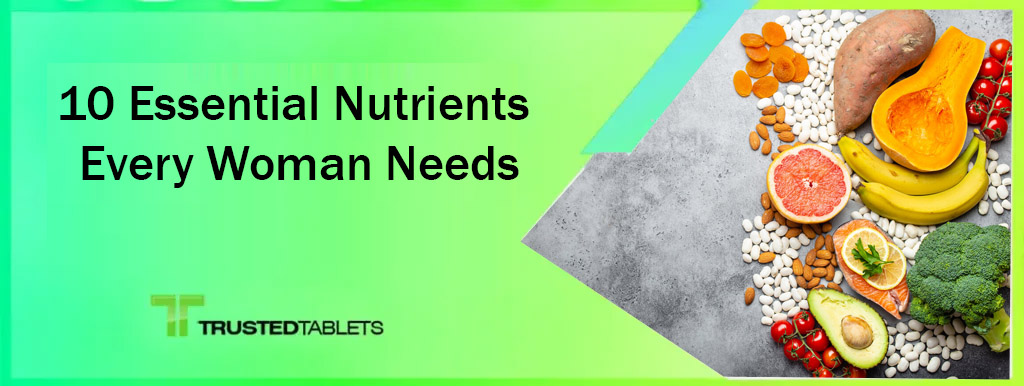Maintaining a balanced and nutrient-rich diet is crucial for every woman, regardless of age. The specific nutritional needs of women vary across different stages of life, including puberty, childbearing years, and menopause. Here, we explore the 10 essential nutrients that every woman needs to ensure optimal health and well-being.
1. Iron: Supporting Energy Levels and Preventing Anemia
Iron is a vital mineral, particularly for women of reproductive age, as it helps to compensate for the iron lost during menstruation. Without sufficient iron intake, women can experience fatigue, weakness, and a higher risk of developing iron-deficiency anemia. To maintain healthy iron levels, we recommend consuming foods such as lean meats, beans, spinach, and fortified cereals.
Key Benefits of Iron:
- Supports red blood cell production.
- Improves oxygen transport throughout the body.
- Reduces the risk of anemia.
2. Calcium: Building Strong Bones and Teeth
As women age, the risk of osteoporosis increases, making calcium an essential nutrient for maintaining bone density. Calcium is especially important during adolescence and early adulthood when bones are still developing. Dairy products like milk, cheese, and yogurt, along with leafy greens, are excellent sources of calcium.
Key Benefits of Calcium:
- Strengthens bones and teeth.
- Helps prevent bone-related disorders such as osteoporosis.
- Assists in nerve function and muscle contraction.
3. Vitamin D: Enhancing Calcium Absorption and Immune Health
Often referred to as the “sunshine vitamin,” vitamin D is crucial for calcium absorption and maintaining healthy bones. Additionally, vitamin D plays a role in boosting the immune system and regulating mood. Women can obtain vitamin D through sun exposure, fortified foods, and supplements.
Key Benefits of Vitamin D:
- Promotes healthy bone development.
- Enhances immune function.
- Supports mental health and reduces the risk of depression.
4. Folate (Folic Acid): Supporting Pregnancy and Cell Growth
Folate, or folic acid, is particularly important for women during their reproductive years, especially during pregnancy. Adequate folate intake reduces the risk of neural tube defects in developing babies. Leafy greens, citrus fruits, and fortified grains are excellent sources of folate.
Key Benefits of Folate:
- Supports healthy cell division and DNA synthesis.
- Reduces the risk of birth defects during pregnancy.
- Promotes overall heart health.
5. Omega-3 Fatty Acids: Supporting Heart Health and Reducing Inflammation
Omega-3 fatty acids are essential for cardiovascular health and reducing inflammation in the body. These healthy fats, found in fish such as salmon, walnuts, and flaxseeds, are beneficial for maintaining a healthy heart and reducing the risk of chronic diseases.
Key Benefits of Omega-3 Fatty Acids:
- Supports heart and brain health.
- Reduces inflammation in the body.
- Helps lower the risk of heart disease and stroke.
6. Magnesium: Aiding Muscle Function and Reducing PMS Symptoms
Magnesium is a crucial mineral for women, helping to regulate muscle and nerve function while also reducing the symptoms of premenstrual syndrome (PMS). It supports over 300 enzymatic processes in the body, including energy production. You can increase your magnesium intake through foods like nuts, seeds, legumes, and whole grains.
Key Benefits of Magnesium:
- Supports energy production and muscle function.
- Reduces PMS symptoms and cramping.
- Helps maintain normal blood pressure and heart rhythm.
7. Vitamin B12: Boosting Energy and Supporting Brain Health
Vitamin B12 is essential for energy production and maintaining a healthy nervous system. Women who follow a vegetarian or vegan diet may be at higher risk for vitamin B12 deficiency, as it is primarily found in animal products like meat, eggs, and dairy. Supplementation or consuming fortified plant-based foods is key for adequate intake.
Key Benefits of Vitamin B12:
- Supports energy levels and reduces fatigue.
- Promotes healthy nerve function.
- Improves brain health and cognitive function.
8. Vitamin C: Strengthening Immunity and Enhancing Skin Health
Known for its immune-boosting properties, vitamin C is a powerful antioxidant that protects cells from damage and supports collagen production for healthy skin. Citrus fruits, strawberries, bell peppers, and broccoli are excellent sources of vitamin C.
Key Benefits of Vitamin C:
- Strengthens the immune system and reduces the severity of colds.
- Promotes healthy skin by boosting collagen production.
- Acts as a powerful antioxidant that protects against free radical damage.
9. Zinc: Supporting Immune Function and Wound Healing
Zinc plays a critical role in immune function and is essential for wound healing and cell repair. A deficiency in zinc can lead to weakened immunity and slower healing. Women can find zinc in foods like shellfish, beef, seeds, and legumes.
Key Benefits of Zinc:
- Supports a healthy immune response.
- Speeds up wound healing.
- Promotes healthy skin and cell repair.
10. Fiber: Promoting Digestive Health and Regulating Cholesterol
Fiber is essential for digestive health and helps prevent constipation by promoting regular bowel movements. It also plays a role in regulating cholesterol levels and supporting heart health. Whole grains, fruits, vegetables, and legumes are rich in dietary fiber.
Key Benefits of Fiber:
- Supports healthy digestion and prevents constipation.
- Helps regulate cholesterol and blood sugar levels.
- Promotes a feeling of fullness, aiding in weight management.


